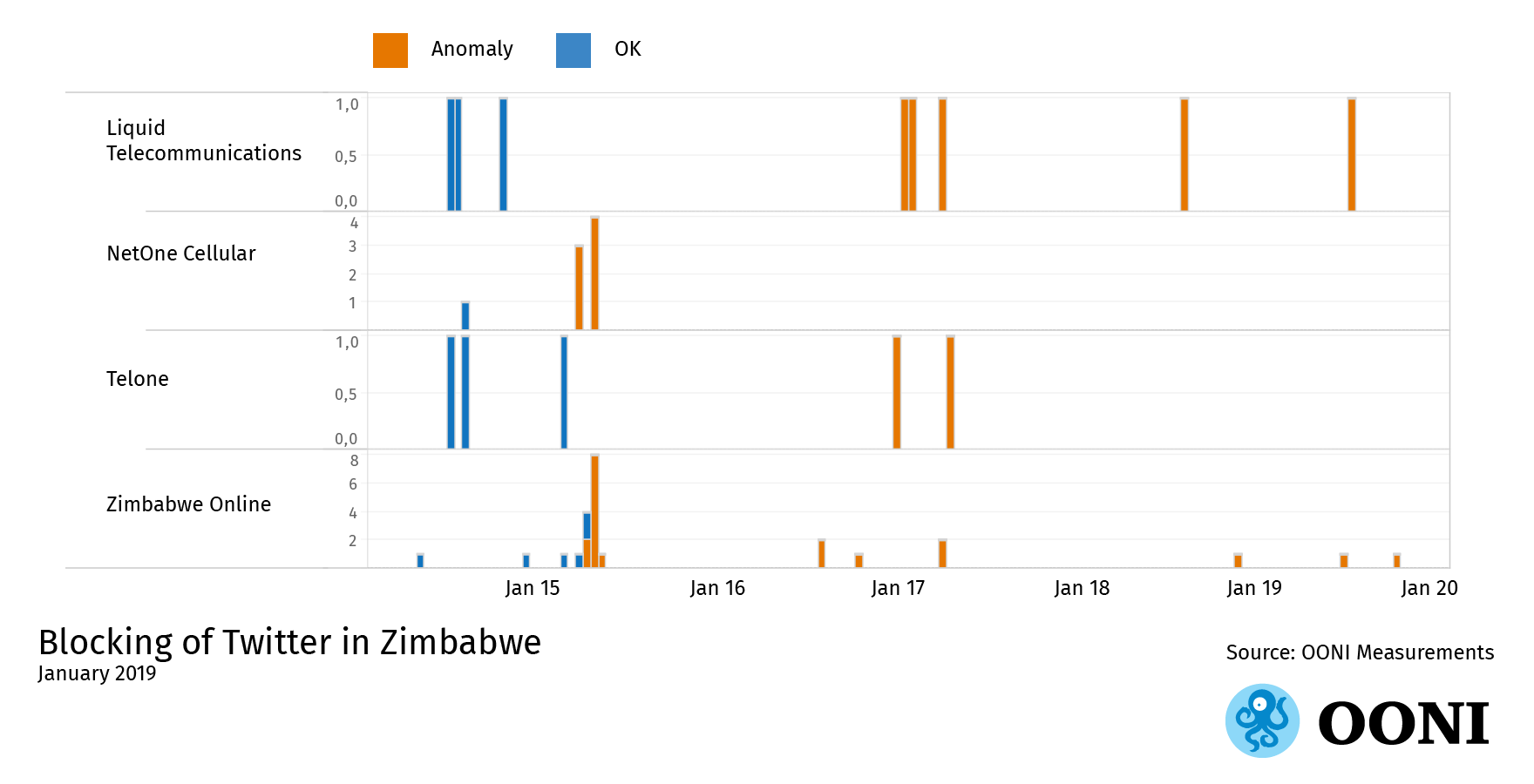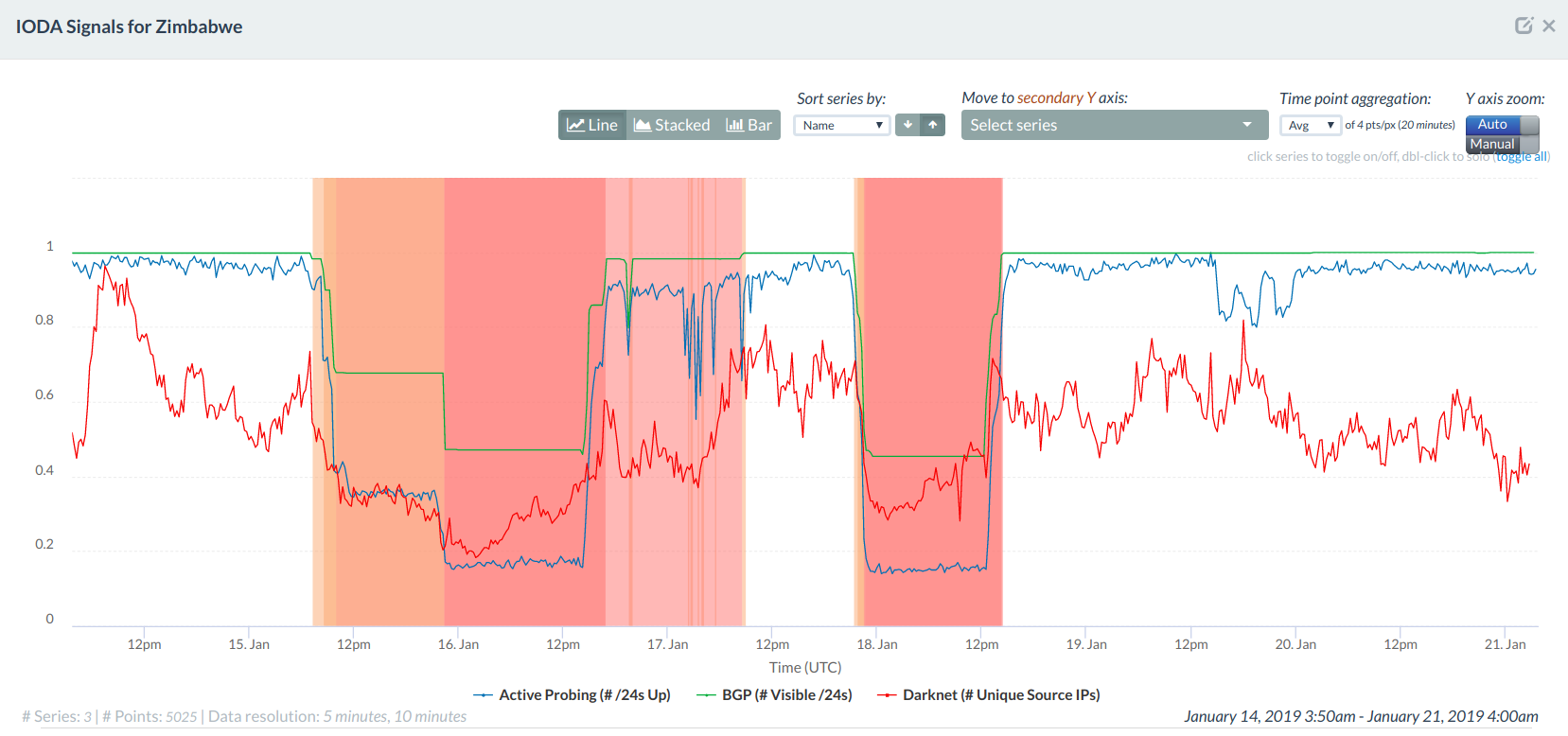Amid the violent crackdown of protests, access to
social media was blocked and the internet was temporarily
shut downcompletely (possibly in an attempt to prevent censorship circumvention, particularly in light of
increased VPN usage).
Internet access in Zimbabwe has since been restored, but certain social media apps remained blocked until 21st January 2019, when the High Court
ruled that the internet blackouts were illegal. Internet service operators immediately restored social media services following this ruling.
In this report, we share
OONI data that shows the blocking of social media during Zimbabwe’s fuel protests. We also share
IODA data which sheds light on the two internet disruptions that occurred in the country over the last week.
Social media blocking
Facebook, WhatsApp and Twitter were
reportedly blocked during the fuel protests. To confirm this (and to examine how the censorship was implemented), local communities in Zimbabwe ran
OONI Probe, which is free software designed to measure various forms of internet censorship.
Twitter
Amid the deadly protests, Twitter was
reportedly blocked in Zimbabwe as well.
Similarly to WhatsApp and Facebook Messenger, the following graph (based on
OONI data) shows the blocking of twitter.com across 4 ISPs (
Liquid Telecom,
NetOne,
TelOne,
ZOL) between 14th January 2019 to 20th January 2019.
Source: Open Observatory of Network Interference (OONI) data: Zimbabwe,
OONI Explorer
OONI measurements suggest that
NetOne and
ZOL started blocking twitter.com on 15th January 2019 (at around 7am UTC). All measurements collected from these 4 networks suggest that twitter.com
remained blocked until 19th January 2019. The lack of subsequent measurements limits our ability to determine whether twitter.com has been unblocked, but this has been reported by locals.
It’s worth highlighting that the internet blackouts observed via the previous graph (sharing data on WhatsApp and Facebook Messenger testing) are
also observed with data pertaining to the testing of twitter.com. Across the same 4 ISPs, we can see the same lack of measurements during the same time frames between 15th to 16th January 2019 and 17th to 18th January 2019, further suggesting that two internet blackouts most likely occurred in Zimbabwe.
Instagram and YouTube
Both Instagram and YouTube appear to have been blocked during the protests as well.
Using OONI Probe’s
Web Connectivity test, locals in Zimbabwe tested instagram.com between 14th January 2019 to 17th January 2019 on the following 3 networks:
Liquid Telecom,
NetOne and
ZOL.
Almost all measurements from NetOne and ZOL present the same
HTTP failures, suggesting that these 2 ISPs may have blocked access to instagram.com during the protests. Instagram was only tested on Liquid Telecom on 14th January 2019 and those measurements show that the site was
accessible, but it remains unclear if this ISP blocked instragram.com thereafter.
YouTube was also tested on Liquid Telecom, NetOne, TelOne and ZOL between 14th to 17th January 2019, but the results are quite different. Most measurements presented HTTP failures on
Liquid Telecom,
TelOne and
ZOL, but
no anomalies were detected on NetOne (though youtube.com was not tested on this network after around 5pm UTC on 14th January 2019). YouTube was subsequently tested on NetOne on 21st January 2019, the measurement of which
shows that the site was accessible.
Internet blackouts
As mentioned, the lack of OONI measurements across four different ISPs between two distinct time frames signals the possibility of two internet blackouts having occurred in Zimbabwe. This is further corroborated and more strongly suggested via CAIDA’s
IODA data, illustrated below.
Source: Internet Outage and Detection Analysis (IODA): Zimbabwe,
IODA
Starting at around 7am UTC on 15th January 2019, we can see a drop in the number of visible IP prefixes, along with a drop of reachable IPs in the Zimbabwean IP address space, as well as a drop of connection attempts from Zimbabwean IPs reaching the IODA darknet. By midnight, around 50% of Zimbabwe’s address space appears to have been withdrawn, with the internet disruption lasting for around 15 hours. By 3pm UTC on 16th January 2019, Zimbabwe’s prefixes started to come back online and connectivity was (mostly) recovered by 5pm UTC that day.
However, a second internet blackout is evident on the next day. Starting from 9:15 pm UTC on 17th January 2019, we can observe a complete drop in measurements, with around 50% of Zimbabwe’s prefixes being withdrawn again. In this case, the internet blackout appears to have lasted for about 15 hours (until 12:30 pm UTC on 18th January 2019), and connectivity was restored by 2:30pm UTC on 18th January 2019.
Both internet blackouts detected via IODA data are also confirmed by the lack of OONI measurements on the same dates and during the same time periods.
Conclusion
Although this was not the first time Zimbabwe experienced internet censorship - for example, the election-watchdog site, zimelection.com, was previously
blocked following the country’s 2018 general elections - this was the first time that we observed social media censorship and a complete internet blackout in Zimbabwe (following years of
collecting OONI measurements from multiple local vantage points).
On 21st January 2019, Zimbabwe’s High Court
ruled that last week’s internet blackouts were illegal and ordered the government to restore full internet access to the whole country. Zimbabwean ISPs have since unblocked access to social media apps and sites.
Zimbabwe, though, remains politically fragile.
Last week’s protests were triggered by the government’s announcement to increase the price of fuel, but they
reflect a deeper dissatisfaction following decades of economic hardship. Robert Mugabe governed the country for more than three decades, but was
ousted in 2017. Yet, the Zimbabwe African National Union - Patriotic Front (ZANU-PF) continued to govern Zimbabwe, this time under a new leader: President Emmerson Mnangagwa. The re-election of ZANU-PF, following the 2018 general elections, spurred
violent riots in Harare. Following the latest protests, which were met with a violent crackdown by authorities, the United Nations has
called for a probe into state violence in Zimbabwe.
As political events unfold, continuing to monitor internet censorship is essential. Since this study was carried out through the use of
free and open source software,
open data and
open methodologies, it can be reproduced and expanded upon.
We thank all the Zimbabwean volunteers who have run OONI Probe, making this research possible.





 as in whoever will get the mine strong-armed it from Zimbabwe and told the PM told make a statement that their selling 100% of it to any foreigners interested.
as in whoever will get the mine strong-armed it from Zimbabwe and told the PM told make a statement that their selling 100% of it to any foreigners interested. 

